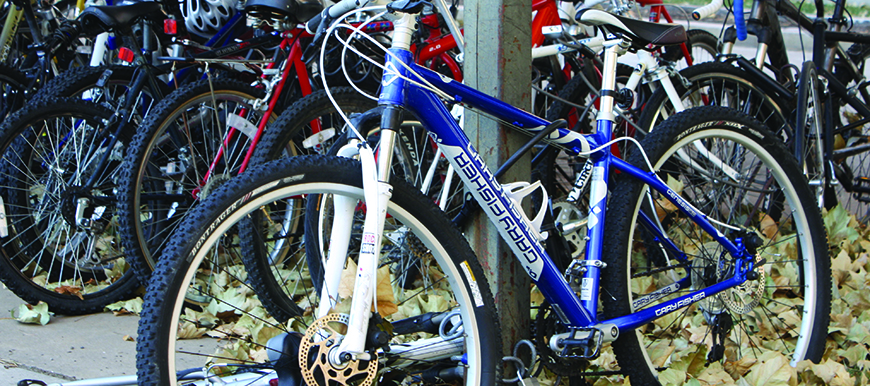Forgotten bikes could end up in surplus, Aggie Blue Bikes
There are several reasons for leaving a bicycle on a rack between semesters — students might forget about them, not use them during the summer or leave them for safekeeping. But because of one policy, they might not be kept safe.
As a result more than 100 students might be asking where their bike is this fall.
Shortly after students leave, forgotten bikes will be confiscated by university police. A bike left on campus could end up being used for parts at Aggie Blue Bikes or sold by USU Surplus, and after a 90-day holding period students can’t get their bikes back.
According to a survey of 2,036 students conducted by Cache County in 2012, about 7 percent of students bike on campus. Of approximately 1,100 bikes, Sergeant Travis Dunn from university police said they tagged “a couple hundred, easy,” that were left on campus.
Campus police usually tag these bikes one to two weeks after the school year ends. The tag notifies the owner that the bike will be impounded if the tag is not removed within seven days. Confiscated bikes are brought to the impound yard near the public safety building, and students then have a 90-day window to claim them. The owner must be able to describe the bike, including its make and model.
This year, Sergeant Travis Dunn said they confiscated roughly 100 bikes. As they were picking up bikes, he said passersby commented, saying some bikes had been sitting there for over a year.
“A lot of these bikes aren’t used. They’re broken down, with flat tires, unable to ride,” Dunn explained.
Unclaimed bikes are given to surplus, but not before Aggie Blue Bikes officials take their pick. This process is mandated in the State Surplus Property Law. According to this rule, before state-owned property can be sold to the general public, state universities and agencies have priority.
Once a year, Aggie Blue Bikes gets a call from university police if they have any unclaimed bikes. Stephanie Tomlin, the Aggie Blue Bikes coordinator, said she suspects police might be trying to make more space on bike racks during the summer.
“There are definitely things that we’re looking for that make a good Blue Bike,” Tomlin said. She said the organization looks for a high-quality frame and favors steel over aluminum, as it is more likely to retain its structural integrity. They also avoid proprietary bikes, which require very specific parts and are difficult to maintain.
“Even if we can’t use it as a Blue Bike, we’ll often take bikes anyway and we’ll just use them for parts. That’s how we keep our 300-plus rental bikes maintained,” Tomlin added.
In a typical year, Aggie Blue Bikes only gets about 10 to 15 bikes from university police.
“Actually, I would bump that number up if you count kids bikes. Counting that, I would say probably 30,” Tomlin said. While they aren’t rented out, kids bikes are donated to the Sub for Santa charity drive at the end of every year. Aggie Blue Bikes has participated in the drive since 2007.
Aggie Blue Bikes is the only non-profit organization these bikes are donated to. Once they’re through, university departments will have two weeks to purchase them from surplus before they can be sold to the general public.
Surplus coordinator Dave Ferrin said pricing is fairly simple, since the bikes are often in poor condition once they receive them.
“We put them out at $25 the day they become available. If more than one person wants them, we bid them. What we don’t sell, we just metal scrap,” Ferrin said. “They’re usually in pretty rough shape because the police store them outside. They’re missing wheels and some parts — they aren’t really bikes at that point.”
Surplus hasn’t received this year’s confiscated bikes from the police yet, but Ferrin said during their last bid, bikes sold for as much as $225.
Sergeant Dunn said he has to tell inquiring students that there isn’t anywhere to store bikes on campus during the summer.
“I advise them to get a storage unit downtown, or find a friend that’s living off campus to store it,” Dunn said. “But we do not have a storage facility here for bikes.”
At Logan Self Storage, the smallest unit for a bike would cost $25 per month, or $100 for the summer break. While pricey for some students, they offer a student discount on padlocks, which would normally cost $12. Depending on the bike, it could be cheaper to buy back from surplus than keep in storage.

